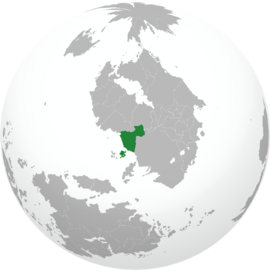Carna
Union of Carnish Councils | |
|---|---|
Flag
| |
Motto: "Wirkers o the warld, unite!" (Carnish) "Luchd-obrach an t-saoghail, aonachadh!" (Carnish Gaelic) "Workers of the world, unite!" | |
 Location of Carna (dark green) | |
| Capital and largest city | Dunaird |
| Official languages Recognised minority languages | Carnish Carnish Gaelic Ænglish |
| Ethnic groups |
|
| Religion |
|
| Demonym(s) | Carnish |
| Government | Federal semi-direct democracy under a non-partisan Bairdist republic |
| Robert Meighan | |
| Sarah Wylie | |
| Legislature | Forgaitherin |
| Formation | |
| 881 | |
| 26 June 1948 | |
| 3 February 1949 | |
| Area | |
• Total | 1,009,396 km2 (389,730 sq mi) |
| Population | |
• 2020 estimate | 98,863,541 |
• Density | 97.9/km2 (253.6/sq mi) |
| GDP (nominal) | estimate |
• Total | $4.647 trillion |
• Per capita | $47,006 |
| Gini | 21.2 low |
| HDI | very high |
| Currency | Carnish Siller (CSR) |
| Time zone | UTC-1 |
| Driving side | right |
| Internet TLD | .ca |
Carna, officially the Union of Carnish Councils, is a country in southern Levantia. It shares land borders with Wealdland to the west, Yonderre to the north, Urcea to the east, and Anglei to the northeast. It covers an area of 1,009,396 km2 (389,730 sq mi) which includes the island of Ardran as well as several smaller islands. The country has a population of almost 99 million, the vast majority of which is situated within the country's coastal regions and central belt. It is a federal semi-direct democracy under a non-partisan Bairdist republic with its capital in Dunaird, the country's largest city and main cultural and economic centre. Other major cities include Malkirk, Inverleith, Dalfearn, Kinlaig, Craigshiel, Largmore, and Colgar.
By 300 CE, the Germanic Ænglish people had migrated into the central areas of modern Carna, establishing permanent settlements in the region. The south and southwestern coastal areas and the mountainous northern areas of modern Carna remained under the rule of the native Gaelic people up until the collapse of Great Levantia in 500 CE. This saw the Ængles conquer much of modern Carna, developing a distinct Ænglo-Gaelic culture that laid the foundation of the Carnish language. In 881, the Kingdom of Carna was founded beginning more than a millennia of independent Carnish rule. Calls for reform in the late 18th century would see the Carnish monarchy relinquish significant power to an elected parliament. Carna would enter the Great War in 1935, fighting alongside their former rival of Urcea. As the war escalated, democratic elections were suspended and the Carnish monarchy retook significant power. In 1947, protests against the monarchy's growing power and the suspension of democratic elections escalated into a number of popular uprisings, culminating in the deposition of the Carnish monarchy in June of 1948 and the establishment of the Union of Carnish Councils later that same month.
Since the 2002 Forgaitherin election, the Social Labour Party (SLP) has remained the dominant party in Carna's national legislature. Every president since the 2003 Carnish presidential election has also ran on an SLP ticket. This has led to accusations that the country has become a dominant-party state. However, several investigations conducted by international organisations have found no evidence of election interference or tampering, and have concluded that Carnish elections remain free and fair. Critics of these accusations also argue that since the Social Labour Party has always held the Forgaitherin with the support of other parties (currently the Communist Party and the Green Party) that the country cannot truly be called a dominant-party state.
Carna is one of the three founding countries of the Treaty of International Assistance and Devlopment (TRIAD) and it's capital, Dunaird, hosts the organisation's headquarters. The country is a highly developed nation, with an advanced high-income economy. It has very high standards of living, quality of life, education, health care, and is categorised as "very high" in the Human Development Index, with it offering expansive social security, a universal healthcare system free at the point of use, strong environmental protections, and a tution-free university education. Due to its high levels of electoral transparency, strong systems of checks and balances, and robust electoral scrutiny, the country also ranks highly in the Democracy Index, currently sitting at second place behind Cartadania.
Known for its long and rich cultural history, Carna has many World Heritage Sites and is among the top tourism destinations in Levantia. The country's national anthem, "Auld Lang Syne", has become an internationally recognised anthem which is sung around the world on New Year's Eve to mark the beginning of a new year.
Etymology
The name Carna comes from Carni, the Latin name for the Celtic peoples that inhabited the westernmost regions of Great Levantia. The name of the Carni is derived from the Carnish Gaelic word càrn, which is the root of the Carnish and Ænglish word "cairn". It is widely believed that the Latin name Carni was given to the westernmost Celts of Great Levantia due to the region's high density of cairns, with more ancient cairns being found in Carna than anywhere else in the world. This is further supported by the Carnish Gaelic name for the region, Càrna, literally meaning "Cairn land" or "Land of cairns".
